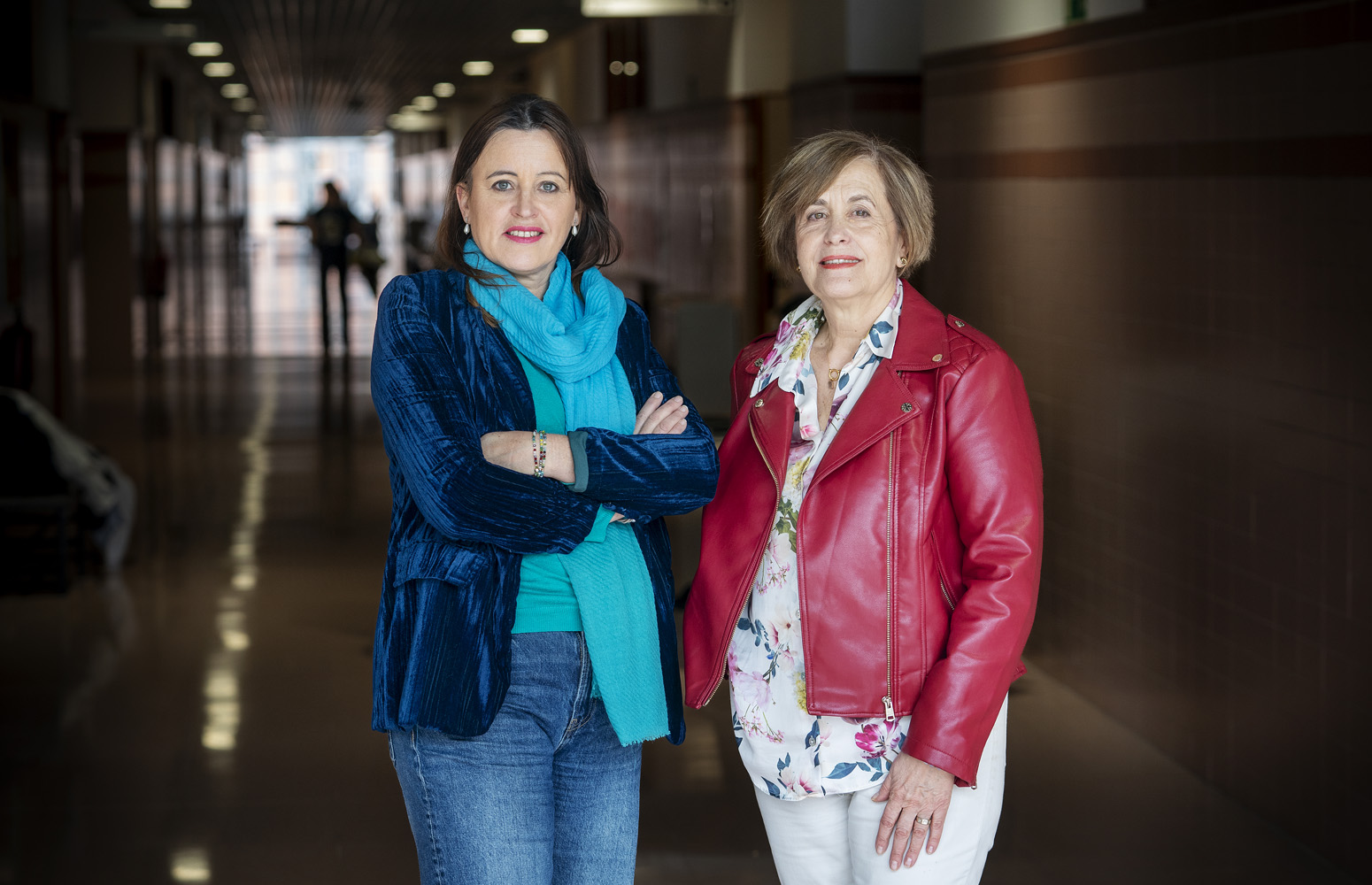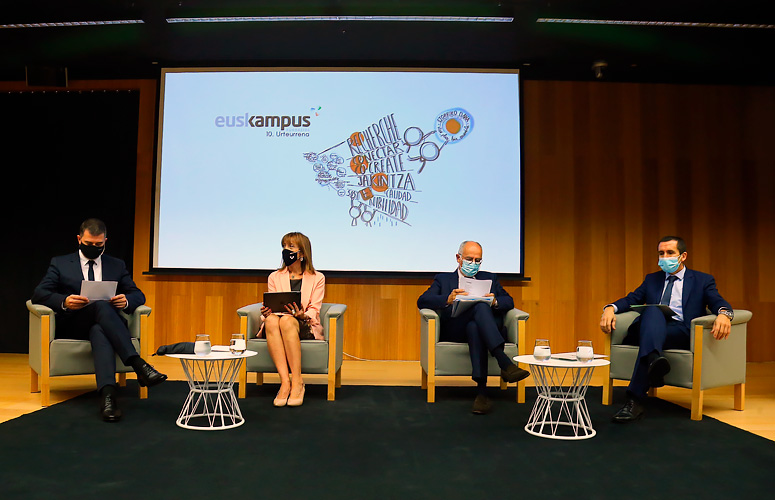Euskampus is committed to partnerships in order to turn the Basque Country and Aquitaine regions into areas of international excellence
Euskampus Fundazioa, an organisation consisting of the UPV/EHU, DIPC (Donostia International Physics Centre), Tecnalia and the University of Bordeaux, is working to consolidate the Cross-Border Campus of International Excellence as a shared cooperative space.
- News
First publication date: 16/07/2021

Euskampus Fundazioa, an organisation that includes the University of the Basque Country/Euskal Herriko Unibertsitatea (UPV/EHU), the Donostia International Physics Centre (DIPC), TECNALIA Technology Research Centre and the University of Bordeaux will be 10 years old just as it takes on a strategic plan for the upcoming decade, with the aim of consolidating what it has achieved and increasing its international dimension. The aspiration of the new Strategic Plan is for Euskampus Fundazioa to become a benchmark institution in Europe that will promote interdisciplinary cooperation in higher education, research and innovation, strengthening its sphere of international influence.
The objective, in short, is to contribute to the common good through cooperation between the UPV/EPU, the University of Bordeaux, DIPC and TECNALIA, along with other local and international authorities, over and above the private interests of each institution. The Strategic Plan is mainly aimed at consolidating the Cross-Border Campus of International Excellence as a shared cooperative space that will bring value to the region, and to promote tools and structural changes that will favour the development of the Basque Country and New Aquitaine into areas of international excellence.
Some of the key findings set out in the Strategic Plan for 2025 are as follows:
- To create four new Joint Research Laboratories (JRL).
- To create five new Cross-Border Cooperation Laboratories (LTC).
- To increase the number of European projects involving TECNALIA and UPV/EHU five-fold, bringing the total to a dozen.
- To double the number of UPV/EHU groups taking part in the different dynamics promoted by Euskampus, reaching 40% of the total number of groups in all knowledge areas.
- To reach the figure of 100 co-tutored theses between the UPV/EHU and the University of Bordeaux, doubling the current figure.
- To double the number of joint degrees of the two universities from the current seven to fourteen.
- To create and manage six knowledge communities, involving more than 1,000 researchers from the UPV/EHU, University of Bordeaux, TECNALIA and DIPC.
- To launch five missions that will make a key contribution to the implementation of the Science, Technology and Innovation Plan 2030. These missions will allow the participation of more than 500 researchers from the UPV/EHU, University of Bordeaux, TECNALIA and DIPC, with the participation of over 200 people from other institutions.
- To encourage the participation of 1,000 students from the UPV/EPU and the University of Bordeaux in the Euskampus communities and missions.
- To hold more than 100 cross-border cooperation meetings, involving more than 2,000 researchers and 1,000 students from both universities.
10 years of excellence in cooperation
Euskampus Fundazioa was originally created to promote the conversion of CEI Euskampus into an International Campus of Excellence, a project headed by the UPV/EHU under the framework of a strategic partnership with TECNALIA and DIPC.
Once the maximum qualification was granted by an international panel in the assessment of the CEI Euskampus Project in 2015, Euskampus Fundazioa continued to develop the core cooperative actions implemented in that project: the Knowledge Hub Community (research groups for fostering collaboration on specific issues) and the Euskampus-Bordeaux Cross-Border Campus.
During the last ten years, around 20% of research groups from various disciplines of the UPV/EHU, and more than 20 local and international institutions (apart from the UPV/EHU, TECNALIA and DIPC) took part in the dynamic cooperation process of the knowledge hubs. Since 2012, around 4 million euros have been invested by Euskampus Fundazioa, with the aim of encouraging more than 100 cooperative actions (local and international research projects, new postgraduate training programme, knowledge transfer and outreach initiatives), 4 summer schools, and the launch, on the initiative of TECNALIA, of 5 joint research laboratories (JRLs) in fields such as artificial intelligence, renewable marine energies, antibiotic resistance, sustainable concrete or advanced pharmaceutical developments.
Similarly, in 2020, experimentation began on a new challenge-oriented cooperation formula, the Euskampus missions. The Euskampus COVID-19 Resilience Project was launched, addressing 4 challenges, mobilising 9 interdisciplinary cooperative projects and involving more than 60 researchers from the UPV/EHU, DIPC, TECNALIA and the University of Bordeaux, with 234,000 euros invested by Euskampus Fundazioa.
The Cross-Border Campus and other projects
The Euskampus-Bordeaux Cross-Border Campus now includes a broad university and research community of 100,000 students and almost 9,000 teaching and research staff. To date, there are 7 joint PhD degrees: 4 cross-border cooperative laboratories (LTCs) have been launched in the fields of nanoscience, advanced manufacturing, applied mathematics and sustainable concrete; a ground-breaking educational innovation project has been launched (Ocean i3); this has stimulated the defence of more than 50 co-tutored theses; has promoted the publication of more than 300 scientific journals; has developed 9 European projects and 6 Euroregional projects and held 3 symposiums, 3 cross-border meetings and two cross-border summer schools. Euskampus Fundazioa has invested 2 million euros in the development of the Cross-Border Campus. This intensive cooperation work was recognised in November 2018 when the UPV/EHU and the University of Bordeaux received the Dialogue Award. In addition, Euskampus Fundazioa made a significant contribution to the development of ENLIGHT, the European University, with the involvement of both universities and which was accessed jointly and with a shared approach on the Cross-Border Campus.
It remains to be pointed out that, in recent years, Euskampus has provided a new partnership framework between the UPV/EHU and TECNALIA, which is serving to generate a high scientific/technological impact from the complementary relationship of both organisations in the R&D chain. The agreement has made it possible to double collaborative scientific output in recent years, leading to 4 JRLs and bringing together 120 researchers, creating new technological classrooms in more than 50 projects and launching 102 theses on co-management.
Ultimately, Euskampus has become a catalyst in interdisciplinary and multi-agent collaboration that aspires to increase the co-leadership of its strategic members in territorial development and in their international projection, prompting local responses of high socio-economic value to global challenges.







